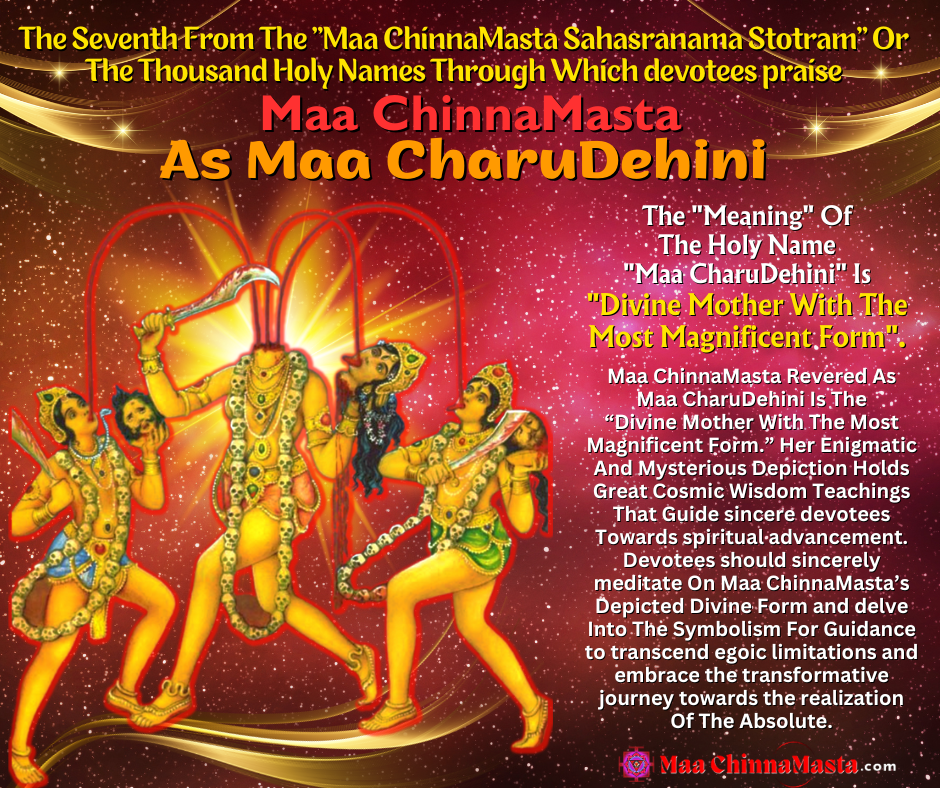The Seventh “Name” And “Meaning” Through Which devotees praise The Divine Mother Maa ChinnaMasta
The Seventh “Name” From The “Maa ChinnaMasta Sahasranama Stotram” Or The Thousand Holy Names Through Which devotees praise The Divine Mother Maa ChinnaMasta Is “Maa CharuDehini”. Maa ChinnaMasta Revered As Maa CharuDehini Is “Divine Mother With The Most Magnificent Form”.
Other “Translations” Of The Divine Name “Maa CharuDehini” Found In literature
In Benard’s book, it is mentioned that The Name “Maa CharuDehini” Means “Incarnation of Belovedness.” This information can be found on page 121 of the book. The “Name” Carries A Significant Connotation That Implies Being A Manifestation Of love and endearment.
Furthermore, the book also provides a classification of “The Thousand Names” based on the nine rasa, which are different emotional flavors or sentiments in indian aesthetics. According to this classification, The Name “CharuDehini” Falls under category 1, which is the Erotic rasa. The Erotic rasa encompasses emotions related to love, desire, passion, and sensuality. This classification can be found on page 139 of the book.
Overall, According to Benard (1994) The Name “Maa CharuDehini” Is Associated With The Embodiment Of Belovedness And Falls Under the category of “Erotic” emotions in the classification Of “The Thousand Names.”
In The “Shri Maa ChinnaMasta Sahasranama Stotram”, The Seventh Holy Name Of The Divine Mother Maa ChinnaMasta Can Be Found In Verse 9. The Verse Is As Follows:
“Om Pracandacandika Canda Candadaityavinasini ।
Camunda Ca Sacanda Ca Capala Carudehini ॥ 9 ॥”
The various meanings of the words “charu” and “dehini” in general
To understand more About The “Translation” And “Meaning” Of The Holy “Name”, it is important to explore the various meanings of the words “charu” and “dehini” in general.
The word “charu” is rich in meanings across bengali, hindi, and sanskrit languages. It encompasses a wide range of qualities and attributes. Firstly, “charu” conveys the idea of beauty, representing something visually appealing and attractive. It implies a sense of pleasantness and charm, suggesting an inherent quality that captivates and delights the senses.
Furthermore, “charu” also signifies good looks and the notion of being fine or well-formed. It carries connotations of physical attractiveness and aesthetics. The term implies finesse and refinement, suggesting a certain level of sophistication and elegance.
Beyond its association with physical appearance, “charu” extends to encompass qualities of politeness and manners. It represents someone who carries themselves with grace and dignity, displaying polite behavior and demonstrating a sense of decorum.
Additionally, “charu” is often linked to the domain of fine arts. It denotes artistic beauty, suggesting an aesthetic quality that is pleasing and captivating. This can refer to various forms of artistic expression, including visual arts, music, dance, or literature.
In a feminine context, “charu” can describe an individual possessing pleasing manners and a charming smile. It reflects qualities of amiability, warmth, and friendliness, enhancing the overall appeal and attractiveness of a person.
On the other hand, “dehini” emphasizes the corporeal nature of something. It conveys the idea of having a physical body, emphasizing materiality and substantiality. It suggests that something is tangible and has a physical presence. Furthermore, “dehini” can also connote the concept of incarnation, indicating that something is embodied or manifest in physical form.
In summary, the word “charu” encompasses a multitude of meanings, encompassing beauty, pleasantness, charm, good looks, finesse, politeness, fine art, grace, elegance, loveliness, and handsomeness. It further extends to describe a feminine individual with pleasing manners and a charming smile. Conversely, “dehini” emphasizes the corporeal, material, and incarnate nature of something. Together, these terms capture a rich tapestry of qualities and characteristics that reflect beauty, physicality, and artistic expression.
Conclusion
Maa ChinnaMasta Revered As Maa CharuDehini Is “Divine Mother With The Most Magnificent Form.” The Depiction Of Maa ChinnaMasta As Maa CharuDehini Emphasizes Her Awe-Inspiring Divine Presence. Sincere devotees Of Maa ChinnaMasta find great significance In The Depiction Of Her Enigmatic And Mysterious Form, Which Reveals Profound Cosmic Wisdom Teachings.
The Portrayal Of Maa ChinnaMasta’s Form Symbolizes deeper esoteric meanings that are highly mystical and metaphoric, Guiding seekers to delve Into The Wisdom Teachings Hidden Within. Maa ChinnaMasta’s Depiction Serves As A Reminder Of the impermanence and illusory nature of the physical body, Guiding sincere devotees to go beyond the superficial aspects of existence and explore the depths of their own spiritual essence.
By contemplating and sincerely meditating On The Depiction Of Maa ChinnaMasta’s Divine Form, devotees can Receive Divine Guidance to explore deeper layers of consciousness, confront their own egoic tendencies, and embrace the transformative power of self-sacrifice, and be on the path towards spiritual advancement and Self-Realization.
References:
Anne, B. E. (1994). Chinnamasta: the Aweful Buddhist and Hindu Tantric Goddess.
http://www.bangladict.com/%E0%A6%9A%E0%A6%BE%E0%A6%B0%E0%A7%81
https://www.dictionaryfaq.com/%E0%A6%9A%E0%A6%BE%E0%A6%B0%E0%A7%81/bntobn
https://www.freebanglafont.com/bangla-to-bangla-meaning.php?id=294241
http://www.bangladict.com/%E0%A6%A6%E0%A7%87%E0%A6%B9%E0%A7%80

